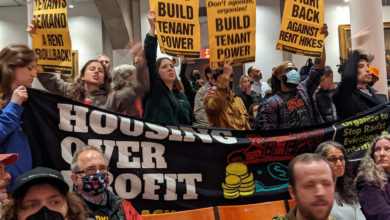Image credit: Liberation News
On March 25, Los Angeles Police Department enclosed Echo Park, site of an encampment, in a metal fence and forced the remaining unhoused residents to evacuate from the park. Before this concerted effort to “sweep” Echo Park, over 200 unhoused individuals had been living in the area with over a hundred tents. While City Councilman Mitch O’Farrell called the forced removals a success, pointing to the number of unhoused people that have been offered temporary shelter, the reality is that people have been violently forced into precarious circumstances without access to permanent housing.
Temporary housing, whether in the form of shelters or hotels, has been criticized as too far away from the park. With strict rules that are difficult to follow, it is overall an inadequate solution to the housing crisis in Los Angeles. Additionally, temporary housing places a burden of uncertainty on unhoused individuals who need to continuously plan for where to go next. Given the resistance from the unhoused community in Echo Park, it is clear that temporary housing is not the preferred option.
With news of an impending LAPD sweep in Echo Park, organizations working to defend the park against the evictions called for an urgent action to defend against this new onslaught. Organizers from Echo Park Rising, Street Watch LA, and Ground Game LA, among other organizations, were on the ground.
On the morning morning of March 24, the day before Echo Park was fenced off, over 500 people arrived to stand in solidarity with the park residents. They marched to Councilman O’Farrell’s office to demand housing and an end to the sweeps. With O’Farrell nowhere in sight to respond to his constituents, the group left with a plan to return that evening.
Later in the day, the group faced approximately 400 officers with multiple LAPD helicopters flying overhead. Organizers on the ground estimated that the LAPD presence would have cost hundreds of thousands of dollars in city funds, which could have been better dedicated towards housing. The protesters and community allies squared off against LAPD until the cops succumbed to the pressure and announced that no evictions for the night would take place, but that they would return in 24 hours.
Overnight, the police fenced off the park, preventing people on either side of the fence access to their belongings, family members, food, jobs, and more. That night, the community held another solidarity protest, and 182 protesters were arrested. Officers fired at the crowd with “less-than-lethal” projectiles. Lastly, on March 26, two final residents of the park who had yet to evacuate were arrested.
Both the unhoused and their supporters have continued to organize to demand housing justice. City officials claim they are acting on behalf of the community, but the community has made loud and clear which side they stand on: arm in arm with the unhoused. In reality, these officials are acting in the interests of profit. The use of massive police force to evict the most vulnerable comes as a special cruelty in the midst of the nation’s worst pandemic. It is especially important now to organize and to demand housing as a human right!






